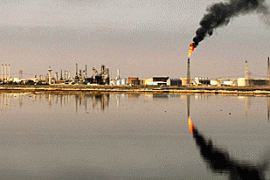BP group wins Iraq oil contract
BP and CNPC accept contract as global firms race to gain access to untapped reserves.

The Rumaila field is estimated to hold 3.3 trillion cubic feet of oil reserves, but also lies in Diyala province, which has seen some of Iraq’s worst violence in recent years.
Security concerns
A total of 32 firms, including US and European giants ExxonMobil and Shell and companies from China, India and other Asian states, are chasing the opportunity to get 20-year service contracts to develop six giant oil fields and two gas fields.
| In depth |
|
|
Three fields were offered by midmorning on Tuesday but only one deal was struck, as several foreign companies rejected the terms laid down by the government.
Nuri al-Maliki, Iraq’s prime minister, has sought to address company concerns over poor security damaging business prospects and that contracts could be voided by future governments.
He said that the government would “offer security protection, offer all guarantees for their investments and offer all the facilities needed to ensure the success of this process”.
But Mahmoud Almusafir, a former Iraqi diplomat, told Al Jazeera that there were still questions over the transparency of oil contracts in the country.
He said: “This American propaganda [is] telling people that now Iraq is free to do whatever.
“But … who is setting the price and who is controlling?
“Militias from Al Dawa party are controlling the country. They are under the American umbrella; the American occupation,” he said.
The country’s oil industry has suffered from years of neglect and sanctions, and Iraq is hoping foreign investment will bring in the expertise to help raise production levels.
‘Benefits for Iraqis’
Oil Minister Hussein al-Shahristani told Iraqi public television: “Our principal objective is to increase our oil production from 2.4 million barrels per day to more than four million in the next five years.”
He said increasing production to that level would push an extra $1.7tn into government coffers over the next 20 years.
Shahristani has said $30bn of the sum would go to the companies that extract the oil and the rest “would finance infrastructure projects across Iraq – schools, roads, airports, housing, hospitals”.
The oil deposits, holding known reserves of 43 billion barrels of crude, are in southern and northern Iraq while the gas concessions are west and northeast of Baghdad.
Companies awarded deals will have to partner with Iraqi government-owned firms, principally the South Oil Company (SOC), and share management of the fields despite fully financing their development.
They will be paid a fixed fee per barrel, not a share of profits and the fee will only be paid once a production threshold set by the government is reached.
“This raises the question of the profitability of the contract,” a source involved in the bidding told the AFP news agency.
“The companies are the ones investing, but have a big problem with the fact that management will be shared,” the source said.

